Here’s a guide to help you set up a Teamup calendar to manage transportation logistics for a tourism company.
Logistics can get complicated for tourism transportation. You’re scheduling day trips, guided tours, and transportation to activities and events for tours. You might also arrange transportation to and from the airport.
You need to coordinate these aspects for each transportation event:
- Driver availability
- Vehicle type and availability
- Guide (if needed)
- Special requests (extra stops, child seats, etc.)
Of course it’s especially important to prevent double-booking.
The calendar setup
Sub-calendars
Use folders to organize sub-calendars in a logical way. For example, start with main folders for Drivers, Fleet, Guides, and Tours: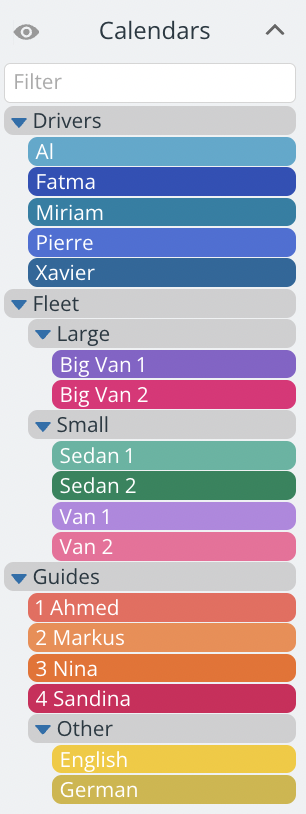
- In the Drivers folder, add a sub-calendar for each driver.
- In the Fleet folder, add a sub-folder for different vehicle types. Then add a sub-calendar for each vehicle within the appropriate sub-folder.
- In the Guides folder, add a sub-calendar for each guide within the appropriate sub-folder. You could also added a nested folder for ad-hoc guide designations, e.g. specific languages or special expertise.
- In the Tours folder, add a sub-calendar for each type of tour or event offered. If you have many different types, organize in sub-folders. You could also add a sub-calendar for “Airport Transport” or “Shuttle Only” to designate these types of transportation needs. Having this set up makes it easy to track which tours are most popular over any time period.
To prevent double-booking, be sure to check “Disallow overlapping events” for the Guide, Driver, and Fleet sub-calendars. See here for details. For sub-calendars in the Tours folder, you can allow overlapping events.
Custom fields
You can add custom fields to capture important details about each tour. For example, set up a multiple choice field with options to capture special requests. Add a text entry below the choice field to note down details about the special requests.
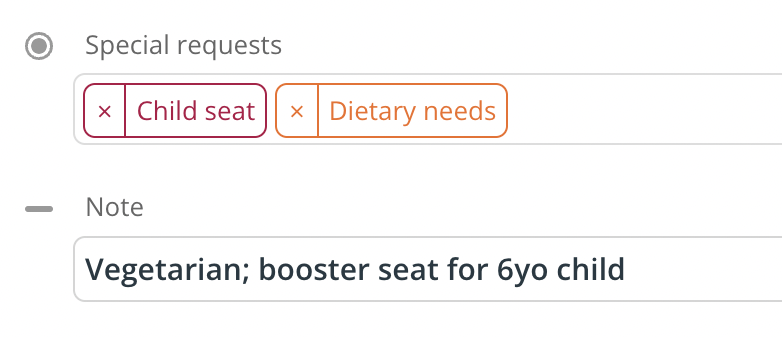
You can also relabel and rearrange the built-in fields. If you don’t need one of the built-in fields, you can deactivate it. See details.
Calendar access
You can give customized calendar access to every member of your team. You can add people to your calendar as account-based users (recommended for staff members) or grant calendar access via unique, shareable calendar links. With both account users and shareable links, you get to choose which sub-calendars each person can access and set the access permission level that’s appropriate.
Here are a few examples.
Office staff
Office or scheduling staff will be taking calls and booking tours. They need to see all sub-calendars and be able to add, edit, and remove events from the calendar as needed.
- Add each member of the office staff as an account-based user.
- Give access to All calendars with Modify permission.
See more about how to customize access for account users.
Drivers and guides
Drivers and guides need to see their own scheduled events, and who they’ll be working with for each tour. Drivers also need to know which vehicle they’ll be driving. They don’t need to modify events that are already on the calendar.
- Add each driver and guide as an account-based user. (Alternately, if you have a large pool of drivers and guides, you can create a unique, shareable calendar link for each one.)
- For Driver Al, assign Add-only permission to his own own sub-calendar. This allows him to add events like a PTO request to his own sub-calendar, but not modify or remove events added by others.
- Next for Driver Al, assign Read-only permission to the other sub-calendars. Or, if you don’t wish for Driver Al to see the scheduled tours for other drivers, do not share those sub-calendars.
- Repeat the process for each driver and guide, assigning Add-only to their own sub-calendar, Read-only to others, and Not shared for any sub-calendar you do not wish them to access.
See more about how to customize access using links.
Drivers and guides can use Teamup mobile apps to see their scheduled events anywhere. More on this below.
Guests
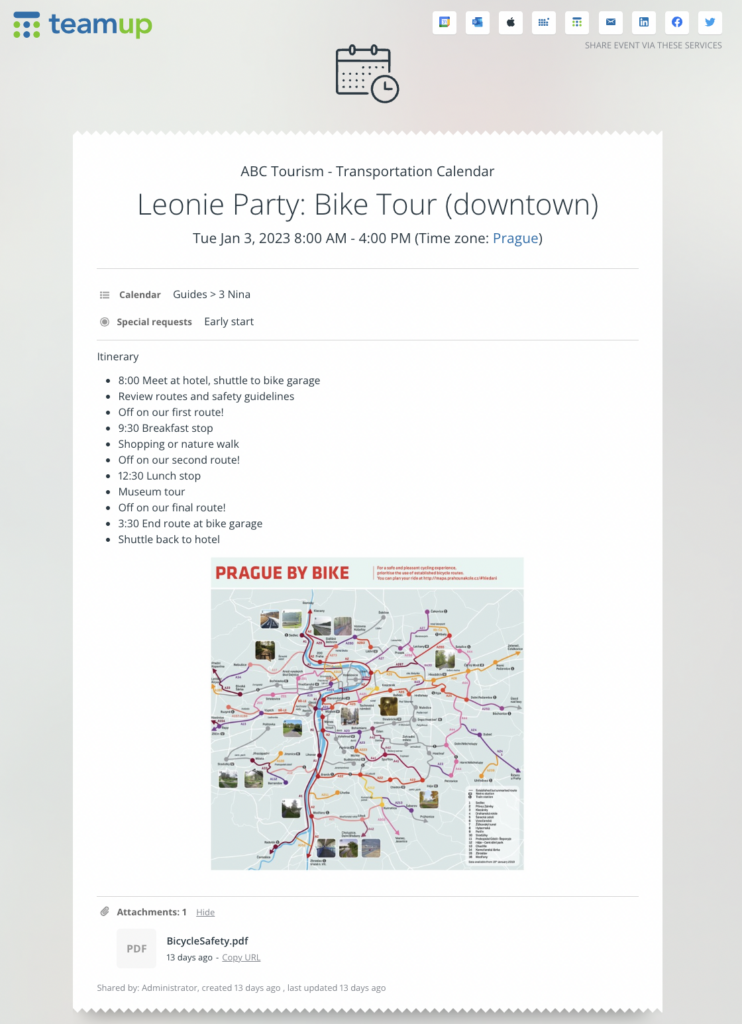
Event page
For guests who have booked tours, you can share the itinerary easily as an event page. Add the itinerary and upload any files, then choose Share > As Page. The event will open as a standalone webpage. You can copy the link to this page and share with guests via email, message, or social media as needed.
Add-to-calendar links
Once the tour is confirmed and the date and time schedule, you can send guests a link as an easy way to add the tour to their personal calendar.
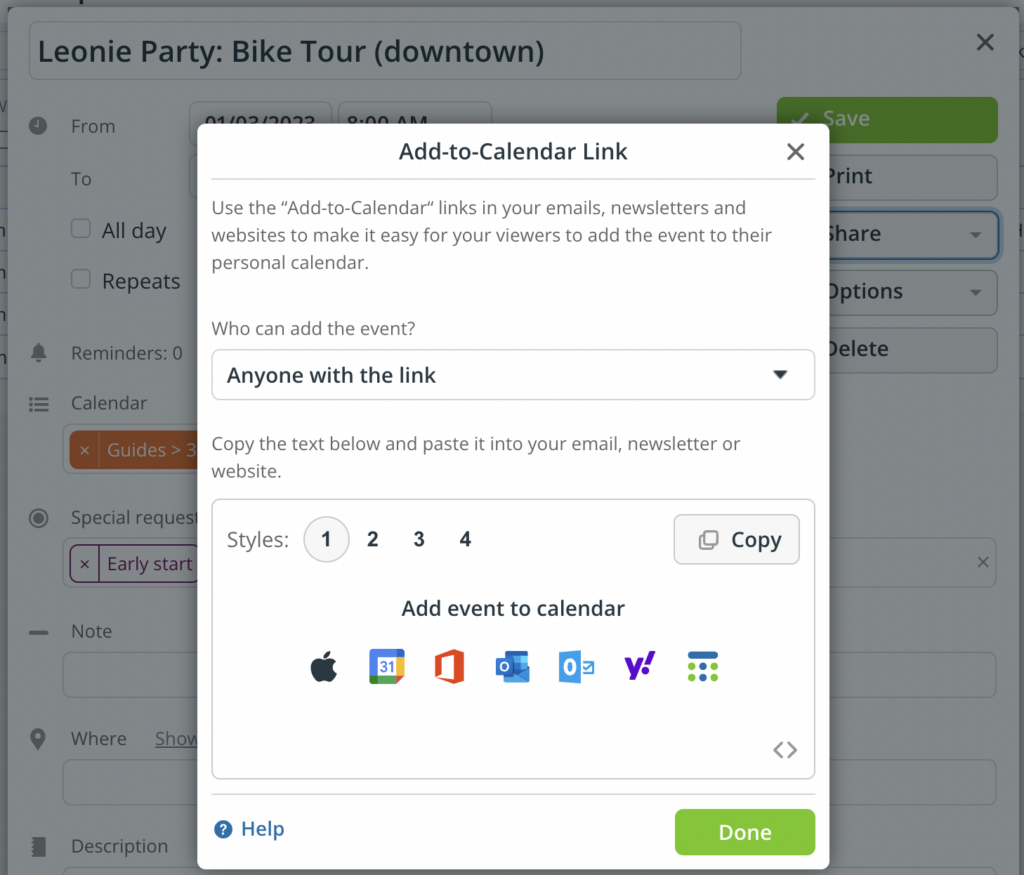
The calendar in action
Scheduling a tour
A customer has called to schedule a day trip. Here’s how the process goes:
- Use the smart filter above the sub-calendar list to quickly find the type of vehicle needed for the customer. They have a group of 5, so you need to schedule a larger vehicle.
- Now you need to assign a driver. It’s an all-day trip, so you find a driver with no other events scheduled for that day and assign it to their calendar.
For some tours, it might make sense to schedule the tour and the transportation as separate events. For example, a group schedules a bike tour. They need a shuttle at the beginning and end of the tour, so you schedule a driver and vehicle for those times as separate events:
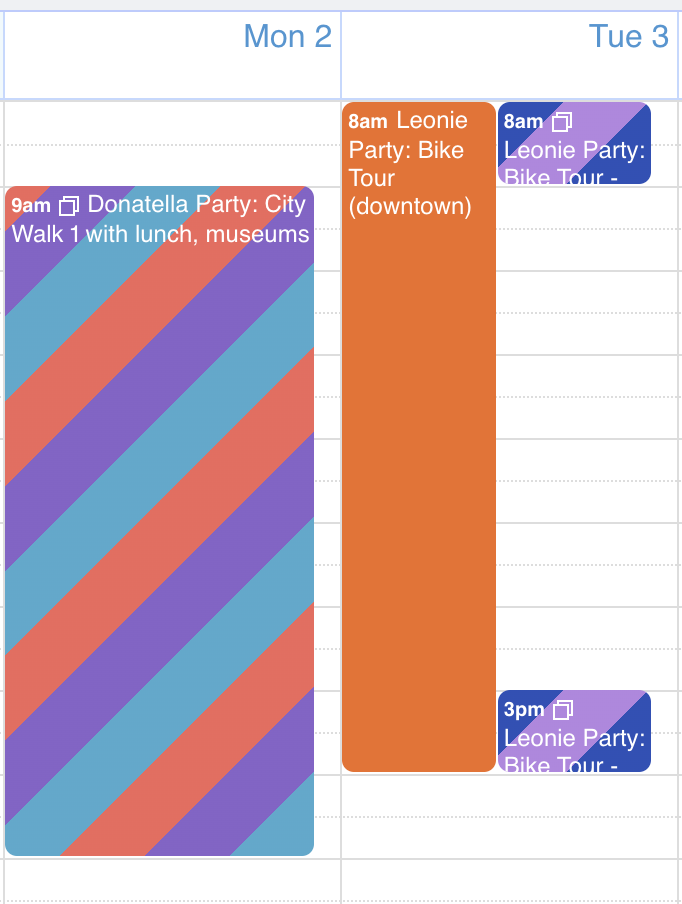
Capturing information
Once the event is created and assigned to all relevant sub-calendars, you can add other information. Upload relevant images or documents, capture special requests, and more right to the event. Having all the information in one place helps to streamline transportation logistics:
- Add any special requests to the custom field.
- You copy the tour itinerary into the Description field.
- You can include images in the Description field and add helpful documents like a waiver or restaurant menu to the Attachments field.

Staying synced
Sharing and keeping all stakeholders up to date is easy with synced calendars and Teamup’s mobile apps.
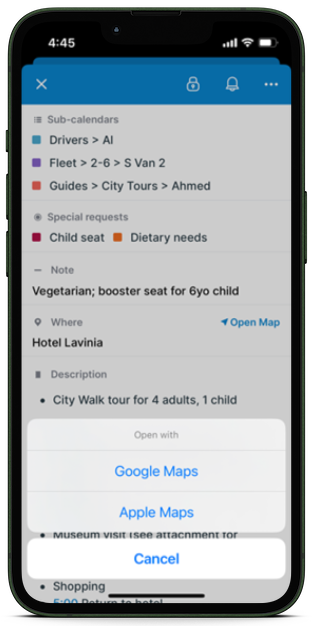
- Encourage the guides to subscribe to change notifications.
- All staff members who have access to the calendar can always see the latest on the calendar, esp. on the apps.
- Guests: Consider sharing the event page or sending add-to-calendar links
- Share the event page for the tour with the guests.
- Sending a reminder via mobile apps to whatever apps relevant, e.g. Whatsapp
Teamup mobile apps for iOS and Android make it easy for the whole team to stay updated. Drivers can tap to open locations in their mapping app. And, if any changes are made to the event, you’ll update the event and it will stay synced across all devices. Everyone has the latest info at all times and transportation logistics can flow smoothly.
Try a live demo calendar to explore possibilities for your tourism transportation and logistics. Learn more about features and when you’re ready, create your own calendar.

